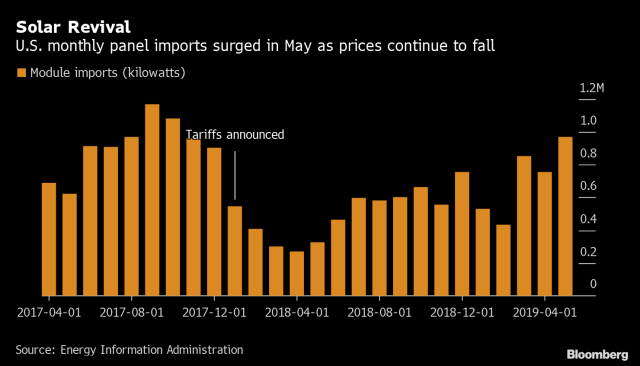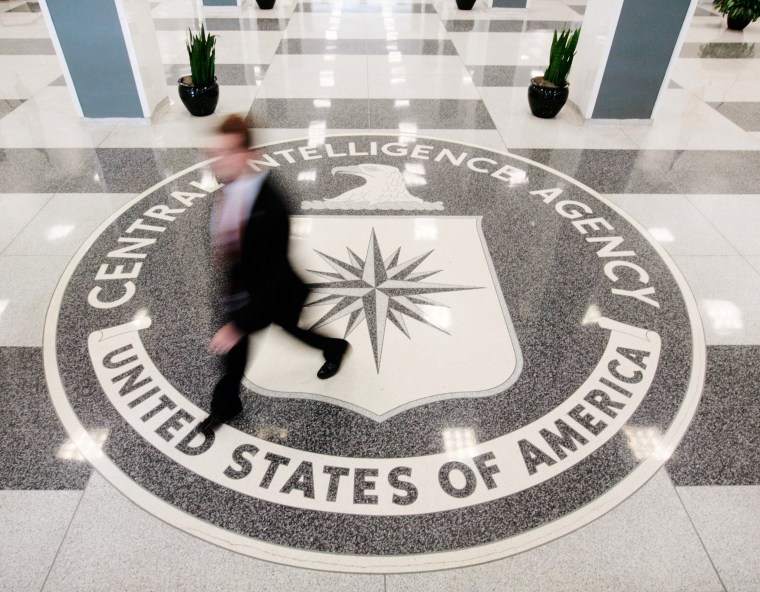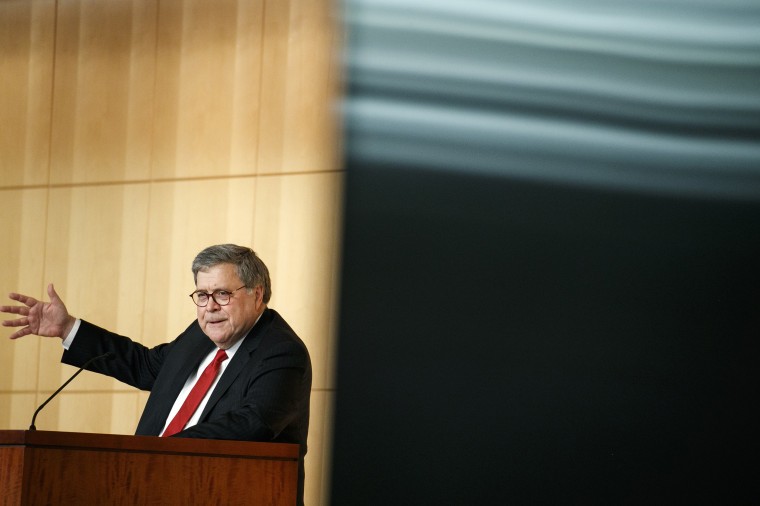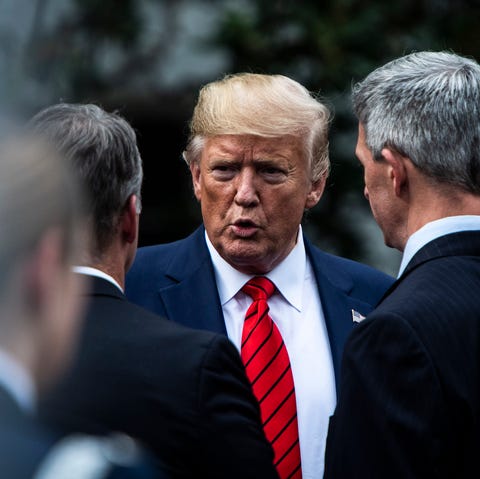Democrat’s War Room
October 13, 2019

Read About The Tarbaby Story under the Category: About the Tarbaby Blog
Issues and events that stink to high heaven
October 13, 2019



Beating Trump is high on the list of things Democrats want to do next year. In fact, it is at the very top of that list. But simply beating this madman won’t change the nature of the problems with the Republican Party, and could actually make them worse. Ring of Fire’s Farron Cousins discusses this.
🔥 Jake Tapper exposes HYPOCRISY of Pompeo, Graham and Giuliani on impeachment using their own words
Jake Tapper is a national treasure! 🔥🔥🔥Follow Occupy Democrats for more.
Posted by Occupy Democrats on Sunday, 13 October 2019

(Bloomberg) — The Trump administration dealt a fresh blow to renewable energy developers on Friday by stripping away an exemption the industry was counting on to weather the president’s tariffs on imported panels.
The U.S. Trade Representative said Friday it was eliminating a loophole granted about four months ago for bifacial solar panels, which generate electricity on both sides. They’ll now be subject to the duties Trump announced on imported equipment in early 2018, currently at 25%. The change takes effect Oct. 28.
The exclusion had been a reprieve for the solar industry, which lost thousands of jobs and put projects on ice as a result of the tariffs. Some panel manufacturers had already begun shifting supply chains to produce more bifacial panels. Stripping the exemption is a blow to developers who build big U.S. solar projects. American panel makers First Solar Inc. and SunPower Corp. will regain an edge on foreign competitors.
“The solar tariffs are back,” Tara Narayanan, an analyst at BloombergNEF, said in an interview Friday. “U.S. solar developers cannot buy products with lower costs and higher output as they briefly thought they could.”
First Solar, the largest U.S. solar panel maker, rose 0.5% to $59.60 at 5:16 p.m. SunPower gained 0.7% to $10.62.
What BloombergNEF Says
“The withdraw of tariff exemption for bifacial will cool down its popularity in the U.S. a little, but not stop the rise of the technology, which introduces improved economics even without tariff exemption.”– Xiaoting Wang, solar analyst
Developers that have used bifacial panels and stand to take a hit from ending the exclusion include Renewable Energy Systems Americas Inc.and Swinerton Inc.
While bifacial panels accounted for just 3% of the solar market last year, BloombergNEF had projected a swift ramp-up in production as manufacturers tried to insulate themselves from U.S. tariffs.
The trade group Solar Energy Industries Association fought to preserve the exemption, saying bifacial technology held “great promise for creating jobs, right here in America.”
“We’re obviously disappointed,” the group’s general counsel, John Smirnow, said Friday. “We look forward to making sure the bifacial exemption gets a fair hearing” during the solar tariff’s mid-term review process.
The U.S. Trade Representative said in its filing that “the exclusion will likely result in significant increases in imports of bifacial solar panels, and that such panels likely will compete with domestically produced” products.
SunPower, based in San Jose, California, opposed the exemption without a cap, saying that it would otherwise defeat the purpose of the tariffs. “It just means everyone is going to make a bifacial,” the company’s chief executive officer, Tom Werner, said in a Sept. 23 interview.
–With assistance from Joe Ryan and Ari Natter.
To contact the reporters on this story: Brian Eckhouse in New York at beckhouse@bloomberg.net;Christopher Martin in New York at cmartin11@bloomberg.net
To contact the editors responsible for this story: Lynn Doan at ldoan6@bloomberg.net, Joe Ryan, Pratish Narayanan
©2019 Bloomberg L.P.

The lobby of the CIA Headquarters building in McLean, Virginia.Larry Downing / Reuters file
WASHINGTON — Weeks before the whistleblower’s complaint became public, the CIA’s top lawyer made what she considered to be a criminal referral to the Justice Department about the whistleblower’s allegations that President Donald Trump abused his office in pressuring the Ukrainian president, U.S. officials familiar with the matter tell NBC News.
The move by the CIA’s general counsel, Trump appointee Courtney Simmons Elwood, meant she and other senior officials had concluded a potential crime had been committed, raising more questions about why the Justice Department later declined to open an investigation.
The phone call that Elwood considered to be a criminal referral is in addition to the referral later received as a letter from the Inspector General for the Intelligence Community regarding the whistleblower complaint.
Justice Department officials said they were unclear whether Elwood was making a criminal referral and followed up with her later to seek clarification but she remained vague.
In the days since an anonymous whistleblower complaint was made public accusing him of wrongdoing, trump has lashed out at his accuser and other insiders who provided the accuser with information, suggesting they were improperly spying on what was a “perfect” call between him and the Ukrainian president.
But a timeline provided by U.S. officials familiar with the matter shows that multiple senior government officials appointed by Trump found the whistleblower’s complaints credible, troubling, and worthy of further inquiry starting soon after the president’s July phone call.
While that timeline and the CIA general counsel’s contact with the DOJ has been previously disclosed, it has not been reported that the CIA’s top lawyer intended her call to be a criminal referral about the president’s conduct, acting under rules set forth in a memo governing how intelligence agencies should report allegations of federal crimes.
The fact that she and other top Trump administration political appointees saw potential misconduct in the whistleblower’s early account of alleged presidential abuses puts a new spotlight on the Justice Department’s later decision to decline to open a criminal investigation — a decision that the Justice Department said publicly was based purely on an analysis of whether the president committed a campaign finance law violation.
“They didn’t do any of the sort of bread-and-butter type investigatory steps that would flush out what potential crimes may have been committed,” said Berit Berger, a former federal prosecutor who heads the Center for the Advancement of Public Integrity at Columbia Law School. “I don’t understand the rationale for that and it’s just so contrary to how normal prosecutors work. We have started investigations on far less.”
Elwood, the CIA’s general counsel, first learned about the matter because the complainant, a CIA officer, passed his concerns about the president on to her through a colleague. On Aug. 14, she participated in a conference call with the top national security lawyer at the White House and the chief of the Justice Department’s National Security Division.
On that call, Elwood and John Eisenberg, the top legal adviser to the White House National Security Council, told the top Justice Department national security lawyer, John Demers, that the allegations merited examination by the DOJ, officials said.
According to the officials, Elwood was acting under rules that a report must occur if there is a reasonable basis to the allegations, defined as “facts and circumstances…that would cause a person of reasonable caution to believe that a crime has been, is being, or will be committed.”
A DOJ official said Attorney General William Barr was made aware of the conversation with Elwood and Eisenberg, and their concerns about the president’s behavior, in the days that followed.
Justice Department officials now say they didn’t consider the phone conversation a formal criminal referral because it was not in written form. A separate criminal referral came later from the Office of the Director of National Intelligence, which was based solely on the whistleblower’s official written complaint.
When Elwood and Eisenberg spoke with DOJ, no one on the phone had seen the whistleblower’s formal complaint to the inspector general of the intelligence community, which had been submitted two days before the call and was still a secret. The issue of campaign finance law was not part of their deliberations, the officials said.
It is illegal for Americans to solicit foreign contributions to political campaigns. Justice Department officials said they decided there was no criminal case after determining that Trump didn’t violate campaign finance law by asking the Ukrainian president to investigate his political rival, because such a request did not meet the test for a “thing of value” under the law.
Justice Department officials have said they only investigated the president’s Ukraine call for violations of campaign finance law because it was the only statute mentioned in the whistleblower’s complaint. Former federal prosecutors contend that the conduct could have fit other criminal statutes, including those involving extortion, bribery, conflict of interest or fraud, that might apply to the president or those close to him.
The decision not to open an investigation meant there was no FBI examination of documents or interviews of witnesses to the phone call, participants in the White House decision to withhold military funding from Ukraine, the president’s lawyer, Rudy Giuliani, and Ukrainian officials who were the target of Trump and Giuliani’s entreaties.
Text messages turned over to Congress Thursday night, in which diplomats appear to suggest there was a linkage between aid and Ukraine’s willingness to investigate a case involving Joe Biden, were not examined as part of the Justice Department’s review, officials said, adding that they conducted purely a legal analysis.
Justice Department spokeswoman Kerri Kupec told NBC News that the decision not to open an investigation was made by the head of the criminal division, Brian Benczkowski, in consultation with career lawyers at the public integrity section. She and other officials declined to say whether anyone dissented.

The operative DOJ standard that the president can’t be indicted while in office was not a factor, she said. Attorney General William Barr has said he believes the president can be investigated and prosecutors can make a determination whether he committed criminal conduct.
“Relying on established procedures set forth in the Justice Manual, the Department’s Criminal Division reviewed the official record of the call and determined, based on the facts and applicable law, that there was no campaign finance violation and that no further action was warranted,” said Kupec.
Kupec declined to comment on whether the Justice Department was investigating any other aspect of the Ukraine matter. There has been no public indication, however, of any such investigation.
Some legal experts are puzzled by Justice Department’s narrow approach.
“They are not by any stretch of the imagination limited to the referral,” said Chuck Rosenberg, an NBC News contributor and former U.S. Attorney. “They have the authority — in fact, they have the obligation — to look more deeply and more broadly and bring whatever charges are appropriate.”
Berger added, “When you get a criminal referral, you don’t go into it saying, ‘This is the criminal violation and now I’m going to see if the facts prove it.’ You start with the facts and the evidence and then you see what potential crimes those facts support. It seems backwards to say, ‘We are going to look at this just as a campaign finance violation and oops, we don’t see it — case closed.'”
In a case in which a government official is allegedly using his office for personal gain, and pressuring someone to extract a favor, the bribery and extortion statutes are usually considered, Berger said. The Foreign Corrupt Practices Act, which prohibits bribery of foreign officials, may also have been implicated, she said.
In his written complaint, the CIA officer who became the whistleblower framed his allegations this way: “I have received information from multiple U.S. government officials that the President of the United States is using the power of his office to solicit interference from a foreign country in the 2020 election.”
But when he first passed on his concerns, they were not so specific, officials said. He first complained at his own agency, sending word through a colleague to a CIA lawyer. The complaint eventually reached the spy agency’s top lawyer, Elwood, officials said.
She was told there were concerns about the president’s conduct on a call with a foreign leader, but not which leader, officials said.
She also was told that others at the National Security Council shared the concerns, so she called Eisenberg, the top NSC lawyer, officials said. He was already aware that people inside his agency believed something improper had occurred on the July 25 call with the Ukrainian president, officials said.
After consulting with others at their respective agencies and learning more details about the complaint, Elwood and Eisenberg alerted the DOJ’s Demers, during the Aug. 14 phone call, in what Elwood considered to be a criminal referral. Demers read the transcript of the July 25 call, officials said, on August 15.
What the DOJ did next is not entirely clear. A DOJ official said it was the department’s perspective that a phone call did not constitute a formal criminal referral that allowed them to consider an investigation, and that a referral needed to be in writing.
The whistleblower was already taking separate action. On Aug. 12, he filed a complaint with the inspector general of the intelligence community, after consulting with a staff member on the House Intelligence Committee, officials said.
At the end of August, the acting director of national intelligence, Joseph Maguire, sent the Justice Department his own criminal referral based on the whistleblower complaint, he has confirmed.
Kupec says career prosecutors in the Public Integrity Section, which works on corruption cases, were involved in deciding how to proceed, as was the national security division and the Office of Legal Counsel.
A senior DOJ lawyer who briefed reporters said the department had no basis on which to open a criminal investigation because Trump’s request of Ukrainian President Volodymyr Zelenskiy to investigate a case involving his political opponent couldn’t amount to a quantifiable “thing of value” under campaign finance law.
DOJ officials said they focused on campaign finance law because that was how the allegations were framed in the whistleblower complaint.
“All relevant components of the department agreed with this legal conclusion,” the DOJ’s Kupec said.
Paul Seamus Ryan, vice president of policy and litigation at Common Cause, is among those questioning even the narrow campaign finance analysis. Common Cause has filed a complaint with the Justice Department and the Federal Election Commission accusing Trump of violating campaign law.
It wouldn’t have been difficult for the government to determine how much money Ukraine would have spent in an investigation of Joe Biden and his son, he said,
“That would give them a dollar amount to show that Trump solicited ‘something of value,'” Ryan said.

There’s a striking simplicity to the scandal that will almost certainly lead to Donald Trump’s impeachment: he used his office to try to coerce a foreign government into helping his re-election campaign. The evidence is unambiguous. More information continues to come to light, but few fair-minded observers believe the president’s guilt is in doubt.
There’s been no explicit need for Trump’s detractors to prove that his scheme included a quid pro quo – the United States would trade something of value to a foreign country in exchange for its participation in the Republican’s gambit – since Trump’s effort was itself scandalous.
But as of this morning, the quid pro quo has nevertheless been established, thanks to a series of text messages that were released overnight. NBC News reported this morning:
Text messages given to Congress show U.S. ambassadors working to persuade Ukraine to publicly commit to investigating President Donald Trump’s political opponents and explicitly linking the inquiry to whether Ukraine’s president would be granted an official White House visit.
The two ambassadors, both Trump picks, went so far as to draft language for what Ukrainian President Volodymyr Zelenskiy should say, the texts indicate. The messages, released Thursday by House Democrats conducting an impeachment inquiry, show the ambassadors coordinating with both Trump’s personal attorney Rudy Giuliani and a top Zelenskiy aide.
One text shows Bill Taylor, the acting U.S. ambassador in Ukraine, asking, “Are we now saying that security assistance and WH meeting are conditioned on investigations?” Apparently reluctant to acknowledge criminal wrongdoing in print, U.S. Ambassador to the European Union Gordon Sondland replied, “Call me.”
In a subsequent message, Taylor added, “As I said on the phone, I think it’s crazy to withhold security assistance for help with a political campaign.”
Just as astonishing was a message Kurt Volker, the former special U.S. envoy to Ukraine, sent to a Zelenskiy adviser shortly before the now-infamous Trump/Zelenskiy phone call. The message was clear about the White House’s political expectations, and how a presidential meeting was contingent on the Ukrainian president’s cooperation with the larger scheme.
“Heard from White House,” Volker wrote, “assuming President Z convinces trump he will investigate / ‘get to the bottom of what happened’ in 2016, we will nail down date for visit to Washington.”
The House Foreign Affairs Committee published the texts online here (pdf)
A Washington Post analysis added that the newly released messages not only document the quid-pro-quo element of the scandal, they also offer “a strong suggestion that military aid was used as leverage – and hints at an attempt to hide that.”
For two weeks, Trump’s Republican allies have argued that in order for this to be a real scandal, it would have to include a quid pro quo. That posture has long been wrong: the effort to coerce Ukraine was itself indefensible.
But what will these same GOP voices say now that the evidence has taken the scandal to the next level, meeting the one standard Republicans said had to be met?

 THE WASHINGTON POSTGETTY IMAGES
THE WASHINGTON POSTGETTY IMAGES
It was around nine o’clock on Sunday night when the president of the United States echoed language about a “Civil War” if he is impeached and removed from office. Now, he’ll say he wasn’t calling for a civil war—he was just announcing his belief that there would be a “Civil War like fracture” if he faced consequences for violating his oath of office and betraying the national interest for his personal gain. Never mind that impeachment is a provision of the Constitution designed for removing a lawless or otherwise dangerous chief magistrate from power in a manner that comports with the law. The intent here was clear: to tie one outcome to the other, and place the idea of violent response in millions of minds across this country. The vast majority of people would never act on that, but the tweets were incitement. The message has already been received, loud and clear, by at least one right-wing paramilitary group.
Here is the diatribe trump quoted from a Fox News appearance by Robert Jeffress, one of these devoutly Evangelical pastors who talks a lot about following Jesus and also raises the prospect of violent civil war. Don’t get it twisted: there is no Civil War-like fracture without political violence, and that is what they are threatening.
Pastor Robert Jeffress: “Nancy Pelosi and the Democrats can’t put down the Impeachment match. They know they couldn’t beat him in 2016 against Hillary Clinton, and they’re increasingly aware of the fact that they won’t win against him in 2020, and Impeachment is the only tool they have to get……..rid of Donald J. Trump – And the Democrats don’t care if they burn down and destroy this nation in the process. I have never seen the Evangelical Christians more angry over any issue than this attempt to illegitimately remove this President from office, overturn the 2016……..Election, and negate the votes of millions of Evangelicals in the process. They know the only Impeachable offense that President Trump has committed was beating Hillary Clinton in 2016. That’s the unpardonable sin for which the Democrats will never forgive him………If the Democrats are successful in removing the President from office (which they will never be), it will cause a Civil War like fracture in this Nation from which our Country will never heal.”
Nothing like an endless paragraph full of triple ellipses to reassure you the world’s most powerful man is firing on all cylinders. And it continues to amaze that, three years on, we are still hearing about Hillary Clinton and 2016. The Ukraine issue concerns Trump’s conduct in office this year. It has nothing to do with the election he won despite getting fewer votes. (And never mind that, in the more recent 2018 election, Democrats absolutely routed Republicans in the House elections—not exactly an advertisement for the idea this president has the people’s mandate.) The Ukraine scandal has to do with 2016 only insofar as trump is trying to combine three separately debunked conspiracy theories to muddy the waters around what happened.
But none of these details are particularly important, since the president will soon enough be twisting or outright contradicting them to feed a constantly shifting narrative whose only steadfast feature is that he’s totally innocent and it’s actually his opponents who are traitors. Speaking of, the president also called for his political opponent to be arrested Monday morning.
It must be an incredible feeling when you see the President of the United States call for your arrest for a capital offense via some throwaway sentence fragment at the end of a tweet. Traditionally, this kind of dictatorial call for abuse of the justice system would feature in some long, impassioned speech from a balcony. In the Digital Age, however, it takes less than 280 characters to become an Enemy of the State. While Schiff did paraphrase the transcript of Trump’s call with the Ukrainian president in language that made Trump’s conduct more explicitly incriminating—a move that was unnecessary and wrong—there is no evidence he committed treason.
Make no mistake: the stakes are ramping up now, and the president’s behavior will grow increasingly erratic and dangerous. He knows full well that once he leaves office, he no longer enjoys the protection of that justice department guideline which dictates a sitting president cannot be indicted. It might be the only reason he hasn’t been. If you thought he lied before, just wait. If you thought he smeared people before, just wait. If you thought he had spasms of vicious stupidity before, just wait. And if you thought he embraced political violence before— and he has—just wait. Right-wing domestic terrorists, some of whom cited the president’s rhetoric specifically, have already engaged in sporadic acts of violence over the last few months and years.
Of course, all of this is just further reason he should be removed, along with the manifest financial corruption at the heart of his domestic and foreign policy-making thanks to his refusal to divest from his private business holdings. He is capable of anything now, and defenders of the republic will need courage in response.